
Karelian question in Finnish politics
Encyclopedia
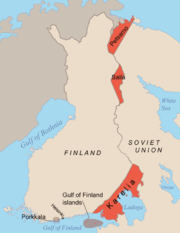
Politics of Finland
Politics of Finland takes place in a framework of a parliamentary representative democratic republic and of a multi-party system. The President of Finland is the head of state, leads the foreign policy, and is the Commander-in-chief of the Defense Forces. The Prime Minister of Finland is the head...
over whether or not to try to regain sovereignty
Sovereignty
Sovereignty is the quality of having supreme, independent authority over a geographic area, such as a territory. It can be found in a power to rule and make law that rests on a political fact for which no purely legal explanation can be provided...
over the Finnish Karelia
Finnish Karelia
Karelia is a historical province of Finland. It refers to the Western Karelia that during the second millennium has been under western dominance, religiously and politically. Western, i.e. Finnish Karelia is separate from Eastern, i.e...
and other territories ceded to the Soviet Union
Soviet Union
The Soviet Union , officially the Union of Soviet Socialist Republics , was a constitutionally socialist state that existed in Eurasia between 1922 and 1991....
in the Winter War
Winter War
The Winter War was a military conflict between the Soviet Union and Finland. It began with a Soviet offensive on 30 November 1939 – three months after the start of World War II and the Soviet invasion of Poland – and ended on 13 March 1940 with the Moscow Peace Treaty...
and the Continuation War
Continuation War
The Continuation War was the second of two wars fought between Finland and the Soviet Union during World War II.At the time of the war, the Finnish side used the name to make clear its perceived relationship to the preceding Winter War...
. Despite the name "Karelian question", the term may refer also to the return of Petsamo
Pechengsky District
Pechengsky District is an administrative and municipal district , one of the five in Murmansk Oblast, Russia. It is located to the northwest of the Kola Peninsula on the coast of the Barents Sea and borders with Finland in the south and southwest and with Norway in the west, northwest, and north...
, ceded parts of Salla
Salla
Salla is a municipality of Finland, located in Lapland. The municipality has a population of and covers an area of ofwhich is water. The population density is....
and Kuusamo
Kuusamo
Kuusamo is a town and municipality in Finland. It is located in the Oulu province and is part of the Northern Ostrobothnia region. The municipality has a population of and covers an area of of which is water. The population density is ....
and four islands in the Gulf of Finland
Gulf of Finland
The Gulf of Finland is the easternmost arm of the Baltic Sea. It extends between Finland and Estonia all the way to Saint Petersburg in Russia, where the river Neva drains into it. Other major cities around the gulf include Helsinki and Tallinn...
. Sometimes the term "Debate on the return of the ceded territories" is used. The Karelian question remains a matter of public debate rather than a political issue, since no significant political party supports the idea.
History
The Karelian question arose when Finland was forced to cede territories to the Soviet Union after the Winter WarWinter War
The Winter War was a military conflict between the Soviet Union and Finland. It began with a Soviet offensive on 30 November 1939 – three months after the start of World War II and the Soviet invasion of Poland – and ended on 13 March 1940 with the Moscow Peace Treaty...
in the Moscow peace treaty in 1940. Most Finnish citizens were evacuated from the ceded areas
Evacuation of Finnish Karelia
As a result of the 1940 Moscow Peace Treaty that concluded the Winter War, Finland ceded the area of Finnish Karelia and other territories to the Soviet Union...
. Most of them returned during the Continuation War
Continuation War
The Continuation War was the second of two wars fought between Finland and the Soviet Union during World War II.At the time of the war, the Finnish side used the name to make clear its perceived relationship to the preceding Winter War...
and eventually were evacuated again in 1944. The evacuees were partly compensated for their losses; farmers, for example, received land in proportion to their earlier holdings. Usually, the compensation was about one third of the original farm. Compensation for movable property was much less. However, all evacuee families had a right to receive a small farm, and/or a plot for a detached house or a flat. The land used for these grants was confiscated by the state from municipalities and private owners. Financial compensation was funded by a general property tax of 10 to 30 %, levied over a period of several years. Because the vast majority of the evacuees who had to settle in the rest of Finland were from ceded Karelia
Finnish Karelia
Karelia is a historical province of Finland. It refers to the Western Karelia that during the second millennium has been under western dominance, religiously and politically. Western, i.e. Finnish Karelia is separate from Eastern, i.e...
, the question was labeled The Karelian Question. After the Winter War, Karelian municipalities and parishes established Karjalan Liitto
Karjalan Liitto
Karjalan Liitto is an interest group for Karelian evacuees.The association was established by Karelian local governments, parishes and provincial organizations on 20 April 1940 immediately after Winter War...
(the Karelian Association) to defend the rights of Karelians in Finland.
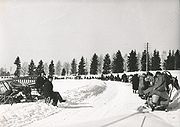
Cold War
The Cold War was the continuing state from roughly 1946 to 1991 of political conflict, military tension, proxy wars, and economic competition between the Communist World—primarily the Soviet Union and its satellite states and allies—and the powers of the Western world, primarily the United States...
, the Karelian-born Finnish politician Johannes Virolainen
Johannes Virolainen
Johannes Virolainen was a Finnish politician.Virolainen was born near Viipuri. After the Continuation War Virolainen moved to Lohja, but he remained one of the leaders of the evacuated Karelians, and never gave up the hope that Soviet Union and later Russia would return Finnish Karelia to Finland...
lobbied for the return of Karelia. President Urho Kekkonen
Urho Kekkonen
Urho Kaleva Kekkonen , was a Finnish politician who served as Prime Minister of Finland and later as the eighth President of Finland . Kekkonen continued the “active neutrality” policy of his predecessor President Juho Kusti Paasikivi, a doctrine which came to be known as the “Paasikivi–Kekkonen...
also tried to reacquire the territory, especially when the Soviet Union returned the peninsula of Porkkala
Porkkala
Porkkala is a peninsula in the Gulf of Finland located at Kirkkonummi in Southern Finland.The peninsula had great strategic value, as coastal artillery based there would be able to reach more than halfway across the Gulf of Finland...
to Finland in 1956. There was, however, no significant public controversy about the case, because Kekkonen wanted to keep it quiet. The last time Kekkonen tried to raise it was in 1972, but he had no success, and public discussion died out in the 1970s.
After the breakup of the Soviet Union, the Karelian question re-surfaced. According to an article by the Finnish newspaper Helsingin Sanomat
Helsingin Sanomat
Helsingin Sanomat is the largest subscription newspaper in Finland and the Nordic countries, owned by Sanoma. Except after certain holidays, it is published daily. In 2008, its daily circulation was 412,421 on weekdays and 468,505 on Sundays...
in August 2007, the Russian president Boris Yeltsin
Boris Yeltsin
Boris Nikolayevich Yeltsin was the first President of the Russian Federation, serving from 1991 to 1999.Originally a supporter of Mikhail Gorbachev, Yeltsin emerged under the perestroika reforms as one of Gorbachev's most powerful political opponents. On 29 May 1990 he was elected the chairman of...
unofficially offered to sell ceded Karelia to Finland in 1991. However, according to many Finnish political leaders and the Russian vice Prime Minister of the time, there were no such offers, only unofficial probing of the idea. Andrei Fyodorov, an advisor of Boris Yeltsin, told the Helsingin Sanomat, that he was part of a group, that was tasked by government of Russia in 1991–1992 with calculating the price of returning Karelia to Finland. This price was set at 15 billion US dollars. According to Fyodorov, Finnish president Mauno Koivisto
Mauno Koivisto
Mauno Henrik Koivisto is a Finnish politician who served as the ninth President of Finland from 1982 to 1994. He also served as Prime Minister 1968–1970 and 1979–1982...
and foreign minister Paavo Väyrynen
Paavo Väyrynen
Paavo Matti Väyrynen is a Finnish veteran politician of the Centre Party. Väyrynen has held several ministerial portfolios and is also a former Member of the European Parliament.-Career:...
were aware of these unofficial discussions.
Today
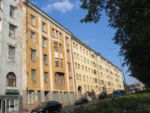
Karjalan Liitto
Karjalan Liitto is an interest group for Karelian evacuees.The association was established by Karelian local governments, parishes and provincial organizations on 20 April 1940 immediately after Winter War...
is an interest group of Karelian evacuees which hopes that Karelia will once again become part of Finland at some point, but does not openly demand it. Some smaller groups, such as ProKarelia
ProKarelia
ProKarelia is a Finnish irredentist group that works for the return to Finland of Finnish Karelia, Petsamo, Salla and some islands in Gulf of Finland ceded to the Soviet Union in past treaties in Moscow and Paris...
, continue to campaign for the peaceful return of Karelia. However, no serious political party has openly supported this goal and Finnish politicians generally say there is no need for it, citing Finland's peace treaty with Russia. There are some individual politicians who support the return of Karelia, for example Ari Vatanen
Ari Vatanen
Ari Pieti Uolevi Vatanen is a Finnish rally driver turned politician and Member of the European Parliament 1999–2009. Vatanen won the World Rally Championship drivers' title in 1981 and the Paris Dakar Rally four times....
, and two candidates of the presidential election of 2006
Finnish presidential election, 2006
The Finnish Presidential election of 2006 saw the re-election of Tarja Halonen as President of Finland for a second six-year term.The first round of voting in Finnish presidential elections always takes place on the third Sunday of January, in this case 15 January 2006...
Timo Soini
Timo Soini
Timo Juhani Soini is a Finnish politician, and co-founder and current leader of the True Finns party. He was a member of the European Parliament from 2009 until 2011, when he returned to the Parliament of Finland. Well-known as an EU-sceptic populist, he was elected a member of the Espoo city...
and Arto Lahti
Arto Lahti
Arto Henrikki Lahti is a professor of entrepreneurship at the Helsinki School of Economics.He was an independent nominee for the Finnish presidential election in 2006, with themes including preserving the status of small enterprises, rights of overleveraged, political honesty and returning of...
. Other candidates have stated that Finland has signed a peace treaty
Peace treaty
A peace treaty is an agreement between two or more hostile parties, usually countries or governments, that formally ends a state of war between the parties...
and should not campaign for the return of what are now Russian-developed territories.
Official opinions
Both Russia and Finland have repeatedly stated that no open territorial dispute exists between the two countries. Finland's official stance is that the borders may be changed through peaceful negotiations, although there is currently no need to hold open talks, as Russia has shown no intention of returning the ceded areas, or discussing the question. In 1994 Boris YeltsinBoris Yeltsin
Boris Nikolayevich Yeltsin was the first President of the Russian Federation, serving from 1991 to 1999.Originally a supporter of Mikhail Gorbachev, Yeltsin emerged under the perestroika reforms as one of Gorbachev's most powerful political opponents. On 29 May 1990 he was elected the chairman of...
commented that "seizure of Finnish Karelia" was an example of Stalin's totalitarian and aggressive politics. Later in 1997 he stated that the matter was closed. In 2000 President Putin stated that such discussions may endanger Finnish-Russian relations, and in 2001 he said that "changing borders is not the best way to resolve problems", but that possible solutions would be "integration and cooperation".
In 1998 Finnish President
President of Finland
The President of the Republic of Finland is the nation's head of state. Under the Finnish constitution, executive power is vested in the President and the government, with the President possessing extensive powers. The President is elected directly by the people of Finland for a term of six years....
Martti Ahtisaari
Martti Ahtisaari
Martti Oiva Kalevi Ahtisaari is a Finnish politician, the tenth President of Finland , Nobel Peace Prize laureate and United Nations diplomat and mediator, noted for his international peace work....
said that "Finland's official position is that it does not have territorial demands on Russia. However, if Russia wants to discuss returning the ceded areas, Finland is ready for that." Several other politicians holding government office, such as the former foreign minister Erkki Tuomioja
Erkki Tuomioja
Erkki Sakari Tuomioja is the Finnish Minister for Foreign Affairs. He is currently a member of the Finnish Parliament.Tuomioja is a member of the Social Democratic Party of Finland, although his political views are thought to be more to the left than the party line. He is also a member of ATTAC...
and prime minister Matti Vanhanen
Matti Vanhanen
Matti Taneli Vanhanen is a Finnish politician. He is a former Prime Minister of Finland and a former Chairman of the Centre Party. In the second half of 2006 he was President of the European Council. In his earlier career he was a journalist...
, have made statements along the same lines.
Polls and popular opinion
The latest polls show that approximately 26% to 38% of Finns would like to see Karelia return to Finnish control and some 51% to 62% would oppose such a move. In Russia, people associate the word "Karelia" with the Republic of KareliaRepublic of Karelia
The Republic of Karelia is a federal subject of Russia .-Geography:The republic is located in the northwestern part of Russia, taking intervening position between the basins of White and Baltic seas...
instead of Finnish Karelia
Finnish Karelia
Karelia is a historical province of Finland. It refers to the Western Karelia that during the second millennium has been under western dominance, religiously and politically. Western, i.e. Finnish Karelia is separate from Eastern, i.e...
, which makes conducting polls more difficult. In a 1999 poll by MTV3
MTV3
MTV3 is a Finnish commercial television station owned by Bonnier. It had the biggest audience share of all Finnish TV channels until Finnish Broadcasting Company’s YLE1 took the lead. The letters MTV stand for Mainos-TV , due to the channel getting its revenue from running commercials...
, 34% of the people of Vyborg
Vyborg
Vyborg is a town in Leningrad Oblast, Russia, situated on the Karelian Isthmus near the head of the Bay of Vyborg, to the northwest of St. Petersburg and south from Russia's border with Finland, where the Saimaa Canal enters the Gulf of Finland...
supported returning Karelia to Finland and 57% were opposed. Vyborg
Vyborg
Vyborg is a town in Leningrad Oblast, Russia, situated on the Karelian Isthmus near the head of the Bay of Vyborg, to the northwest of St. Petersburg and south from Russia's border with Finland, where the Saimaa Canal enters the Gulf of Finland...
and the rest of the ceded Karelia outside the Republic of Karelia
Republic of Karelia
The Republic of Karelia is a federal subject of Russia .-Geography:The republic is located in the northwestern part of Russia, taking intervening position between the basins of White and Baltic seas...
nowadays contain very few ethnic Finns, and is almost exclusively inhabited by people who moved there during the Soviet era and their descendants.
In the latest poll in Finland about the question, 36% of Finns supported the return of ceded territories, compared to 51% who are opposed. The poll was conducted by the newspaper Karjala and the research institute MC-Info Oy on 13 October 2005. In August 2005, a poll by Helsingin Sanomat
Helsingin Sanomat
Helsingin Sanomat is the largest subscription newspaper in Finland and the Nordic countries, owned by Sanoma. Except after certain holidays, it is published daily. In 2008, its daily circulation was 412,421 on weekdays and 468,505 on Sundays...
and Suomen Gallup, determined that 30% Finns supported and 62% opposed the return. In a poll by Taloustutkimus and Karjalan Liitto done in May 2005, support was 26% while 58% were opposed. A year earlier, a poll by STT showed 38% supporting and 57% opposing. A poll by Taloustutkimus was criticized by ProKarelia
ProKarelia
ProKarelia is a Finnish irredentist group that works for the return to Finland of Finnish Karelia, Petsamo, Salla and some islands in Gulf of Finland ceded to the Soviet Union in past treaties in Moscow and Paris...
for asking leading questions, such as, "Do you support the return of Karelia, even if it would mean more tense relations or even war with Russia?" 5% of supporters and of those who declined to respond supported the return even under these circumstances (2.1% of all replies).
Many of the people who were born in Karelia and were evacuated want Karelia to become part of Finland. According to polls, older people (ages 65 and up) and young people (15-25) support the idea more strongly than the generation of their parents (25-65) who grew up during the Cold War
Cold War
The Cold War was the continuing state from roughly 1946 to 1991 of political conflict, military tension, proxy wars, and economic competition between the Communist World—primarily the Soviet Union and its satellite states and allies—and the powers of the Western world, primarily the United States...
. Former President Mauno Koivisto
Mauno Koivisto
Mauno Henrik Koivisto is a Finnish politician who served as the ninth President of Finland from 1982 to 1994. He also served as Prime Minister 1968–1970 and 1979–1982...
has been against a discussion about the question. Support for regaining the ceded areas is also strong among minor nationalist right-wing groups.
Price
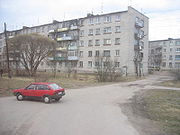
Helsingin Sanomat
Helsingin Sanomat is the largest subscription newspaper in Finland and the Nordic countries, owned by Sanoma. Except after certain holidays, it is published daily. In 2008, its daily circulation was 412,421 on weekdays and 468,505 on Sundays...
, 42 % of Finns opposing the return list that as the most important single reason. The standard of living on the Russian side of the border is much lower than on the Finnish side. The GDP (PPP) per capita in Finland is about two times higher than in Russia.
The costs of bringing Karelia to the same level with the rest of Finland has been researched only by supporters of the idea. According to a survey conducted by ProKarelia, the area has natural advantages that, under the Finnish rule, would make it a centre of trade with Russia and industry and thus bring economic growth fast enough to solve the entire problem. According to both ProKarelian research and Arto Lahti's estimate, the price of return would be about (short scale) 30 billion euro
Euro
The euro is the official currency of the eurozone: 17 of the 27 member states of the European Union. It is also the currency used by the Institutions of the European Union. The eurozone consists of Austria, Belgium, Cyprus, Estonia, Finland, France, Germany, Greece, Ireland, Italy, Luxembourg,...
.
Population
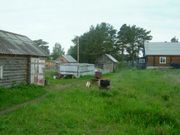
Ukraine
Ukraine is a country in Eastern Europe. It has an area of 603,628 km², making it the second largest contiguous country on the European continent, after Russia...
, Belarus
Belarus
Belarus , officially the Republic of Belarus, is a landlocked country in Eastern Europe, bordered clockwise by Russia to the northeast, Ukraine to the south, Poland to the west, and Lithuania and Latvia to the northwest. Its capital is Minsk; other major cities include Brest, Grodno , Gomel ,...
and Russia, and their descendants. The fate of those people is a major issue in the return of Karelia. According to the poll by Helsingin Sanomat, 14 % of people opposing the return consider its greatest flaw the tensions that would be caused by a Russian-speaking minority being formed in Finland. In 2004, there were about 370,000 Russians living in the region.
If the inhabitants were allowed to stay in their homes, Finland would receive a few hundred thousand new Russian-speaking citizens with no experience of living in Finnish society. In order to provide services for them in their own language, Finland would need many officials capable of speaking Russian. In ProKarelia's vision, nearly half of the Russian population in Karelia would return
Repatriation
Repatriation is the process of returning a person back to one's place of origin or citizenship. This includes the process of returning refugees or soldiers to their place of origin following a war...
to Russia, and even more would leave if Finland paid their expenses for doing so.
See also
- Reunification
- IrredentismIrredentismIrredentism is any position advocating annexation of territories administered by another state on the grounds of common ethnicity or prior historical possession, actual or alleged. Some of these movements are also called pan-nationalist movements. It is a feature of identity politics and cultural...
- Treaty of Tartu (Russian–Finnish)Treaty of Tartu (Russian–Finnish)The Treaty of Tartu between Finland and Soviet Russia was signed on 14 October 1920 after negotiations that lasted for four months. The treaty confirmed the border between Finland and Soviet Russia after the Finnish civil war and Finnish volunteer expeditions in Russian East Karelia. Ratifications...
- Winter WarWinter WarThe Winter War was a military conflict between the Soviet Union and Finland. It began with a Soviet offensive on 30 November 1939 – three months after the start of World War II and the Soviet invasion of Poland – and ended on 13 March 1940 with the Moscow Peace Treaty...
- Interim PeaceInterim PeaceThe Interim Peace was a short period in the history of Finland during the Second World War. The term is used for the time between the Winter War and the Continuation War, lasting a little over a year, from 13 March 1940 to 24 June 1941...
- Continuation WarContinuation WarThe Continuation War was the second of two wars fought between Finland and the Soviet Union during World War II.At the time of the war, the Finnish side used the name to make clear its perceived relationship to the preceding Winter War...
- Moscow ArmisticeMoscow ArmisticeThe Moscow Armistice was signed between Finland on one side and the Soviet Union and United Kingdom on the other side on September 19, 1944, ending the Continuation War...
- Lapland WarLapland WarThe Lapland War were the hostilities between Finland and Nazi Germany between September 1944 and April 1945, fought in Finland's northernmost Lapland Province. While the Finns saw this as a separate conflict much like the Continuation War, German forces considered their actions to be part of the...
- Moscow Peace Treaty
- Territorial changes of the Baltic StatesTerritorial changes of the Baltic StatesTerritorial changes of the Baltic states refers to the redrawing of borders of Lithuania, Latvia and Estonia after 1940. The three republics, formerly autonomous regions ruled by the Baltic German nobility within the former Russian Empire, gained independence in the aftermath of World War I and the...
External links
- Saimaa Canal links two Karelias, thisisFINLAND
- Helsingin Sanomat 3/3/2005. ProKarelia movement wants back ceded areas
- Sergei Prozorov: Border Regions and the Politics of EU-Russian Relations: The Karelian Question and the EU Logic of 'Border Deproblematisation' (PDF)
- Pertti Joenniemi. Ways of Managing Border Disputes in Present-Day Europe: The Karelian Question
- Mauri Rastas's news collection about returning of Karelia (in Finnish)
- Pre-war Finnish topographic maps of Karelia. E.g. Viipuri (Vyborg) map, 1937
Supporting organizations
Information also available in English:- Karjalan Liitto
- ProKarelia
- Karelia Forum - Discussion forum concentrated in the Karelia question
Finnish only:
- Aluepalautus ry.
- Tarton Rauha ry.
- KareliaKlubi
- Kansalaisvetoomus, a petition for returning Karelia

